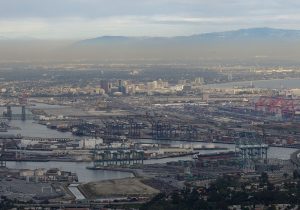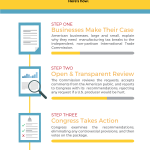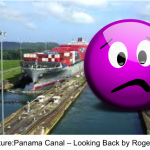Ports of LA & LB PierPass Fee Increase About to Take Effect

Smog over the Port of Los Angeles PICTURE: Nick C. Prior
In two weeks, the Traffic Mitigation Fee (TMF) at the Ports of Los Angeles and Long Beach are going to increase.
TMF is part of the PierPass OffPeak program designed to reduce congestion at the ports and in the surrounding communities by operating terminal gates during “OffPeak” hours at night and on Saturdays. The program also reduces pollution by reducing trucks (and cars around the port) idling in congestion.
The fee increase is 1.9%, which may not sound overly significant but raises the fee to $70.49 per twenty-foot equivalent unit (TEU).
There has been some backlash and complaints to the Federal Maritime Commission (FMC) from shippers since the announcement of the fee increase at the beginning of this month; however, it is unlikely the fee increase will be reversed.
Here is a copy of the PierPass press release the non-profit company also sent to its credit customers regarding the fee increase:
Marine Terminal Operators at Ports of Los Angeles and Long Beach to Adjust TMF on August 8
LONG BEACH, Calif., July 8, 2016 – The West Coast MTO Agreement (WCMTOA) today announced a 1.9 percent increase in the Traffic Mitigation Fee (TMF) at the Ports of Los Angeles and Long Beach, scheduled to take effect on August 8, 2016. The increase will sustain continued operation of PierPass OffPeak gates amid labor cost increases.
Beginning August 8, the TMF will be increased to $70.49 per TEU (twenty-foot equivalent unit) or $140.98 per forty-foot container.The adjustment falls under Rule 7 of WCMTOA’s Marine Terminal Schedule No. 1, which states, “Beginning in mid-2012, the Fee shall be adjusted annually to reflect increases in labor costs based on Pacific Maritime Association maritime labor cost figures.” The PMA negotiates and administers maritime labor agreements with the International Longshore and Warehouse Union (ILWU).
PierPass launched the OffPeak program in 2005 to reduce severe cargo-related congestion on local streets and highways around the Los Angeles and Long Beach ports. OffPeak established regular night and Saturday work shifts to handle trucks delivering and picking up containers at the 13 container terminals in the two adjacent ports.
Using a congestion pricing model, PierPass charges a TMF on weekday daytime cargo moves to incentivize cargo owners to use the OffPeak shifts. The TMF also helps pay for the labor and other costs of operating the OffPeak shifts.According to an analysis by maritime industry consultants SC Analytics, the costs incurred by the terminals to operate the OffPeak shifts in 2015 totaled $236.2 million. During the year, the terminals received $168.9 million from the Traffic Mitigation Fee, offsetting only part of the OffPeak program’s costs.
Since 2005, OffPeak has taken more than 35 million truck trips out of daytime Southern California traffic and diverted them to less congested nights and weekends. About half of all port truck trips now take place during the OffPeak shifts.
For those of you who want to know more about PierPass and the OffPeak program, included below is the company’s own overview of PierPass and OffPeak:
PierPass Inc. is a not-for-profit company created by marine terminal operators at the Port of Los Angeles and Port of Long Beach to address multi-terminal issues such as congestion, air quality and security.
PierPass launched the OffPeak program in 2005 to reduce severe cargo-related congestion on local streets and highways around the Los Angeles and Long Beach ports. OffPeak established regular night and Saturday work shifts to handle trucks delivering and picking up containers at the 13 container terminals in the two adjacent ports.
PierPass developed OffPeak as a market-based solution to what was then a critical public problem: after a rapid rise in cargo volume in the early 2000s, drayage trucks were causing severe congestion on the roads and highways and in the neighborhoods around the ports, while thousands of idling trucks caught in this traffic every day added to air pollution. The ports came under strong community and political pressure to find a solution.
OffPeak nearly doubled the potential capacity of the ports without requiring taxpayer funding or waiting years for new infrastructure construction. Since 2005, OffPeak has taken more than 35 million truck trips out of daytime Southern California traffic and diverted them to less congested nights and weekends.
Prior to the OffPeak program, 88% of the containers that were picked up and delivered to the ports by truck did so within the first shift of operations, between 8:00 a.m. and 5:00 p.m., Monday through Friday. Since the OffPeak Program’s started in 2005, approximately 50% of the trucks call during the first shift and 50% during the OffPeak shifts between 6:00 p.m. and 3:00 a.m. on weekdays and between 8:00 a.m. and 5:00 p.m. on Saturdays.
On an average OffPeak weeknight shift in the spring of 2016, 15,000 trucks visited the ports. If all of these trucks were lined up bumper-to-bumper, they would form a line 160 miles long, stretching more than halfway to Las Vegas. Without the OffPeak program, this cargo would be crammed into a single day shift, doubling daytime volumes and once again causing severe congestion, leaving truck drivers stuck in hours-long jams.
Using a congestion pricing model, PierPass charges a Traffic Mitigation Fee (TMF) on weekday daytime cargo moves to incentivize cargo owners to use the OffPeak shifts. The TMF also helps pay for the labor and other costs of operating the OffPeak shifts. All fees collected, minus the costs incurred by PierPass to manage the program, are allocated to the terminal operators according to the volume of cargo they handle.
PierPass was established by the West Coast MTO Agreement, which is on file with the Federal Maritime Commission.




